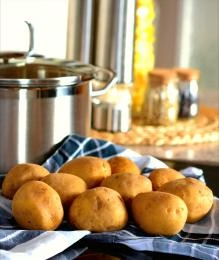Why do some ingredients, like eggs, get harder the longer they’re cooked, while others, like potatoes, get softer? What causes these differences in hardness and softness? What other effects and changes does cooking have on ingredients?
Why do eggs get harder and potatoes get softer the longer they’re cooked?
The longer eggs are cooked, the harder they become. The longer potatoes are cooked, the softer they become. Why does heat have such different effects on food?
The simple answer is: cooking hardens proteins but softens carbohydrates. We’re not discussing meat here because its toughness or softness is determined by complex factors, including the muscle structure of the animal, the part of the animal it comes from, and how it’s cooked.
For example, meat may become softer first and then tougher during cooking. However, the different effects of heat on proteins and carbohydrates can be explained by the different effects of heat on proteins and carbohydrates.
The Composition and Structure of an Egg
First, let’s take a closer look at the egg. Its composition is quite unusual, as befits its unique function in life. If we discard the shell and remove the water inside, the dry residue is about half protein and half fat, with almost no carbohydrates. The dry yolk is 70% fat, while the dry egg white is 85% protein.
You know that heat doesn’t significantly alter the composition of fat, so let’s focus on the protein in the egg white. And you also know we can’t explain this without mentioning what the molecules are doing, right?
The albumin in the egg white is made up of long, tangled molecules that resemble loose balls of yarn. When heated, these balls partially unravel, then stick together in various places, forming a tangled mess.
When a substance’s molecules transform from a loose collection of balls into a tangled mess, it noticeably loses its fluidity. It also becomes opaque, meaning light can’t penetrate it.
How Eggs React When Heated
When liquid egg whites are heated above approximately 150°F (65°C), they coagulate into a firmer, white, opaque gel. The higher the temperature and the longer the cooking time, the more the proteins unravel and weld together. The longer the egg is cooked, the harder it becomes.
Eggs can progress from a runny, soft consistency to a rubbery, hard consistency, and then to the leathery, “well-done” quality typical of cheap restaurants. Furthermore, the drying effect of high temperatures can increase the degree of hardening.
The proteins in the yolk coagulate in a similar manner, but at a higher temperature. Furthermore, the yolk’s rich fat acts as a lubricant between the small clusters of proteins, preventing them from welding as tightly. As a result, even if the egg is cooked for a long time, the yolk doesn’t become as hard as the egg white.
How Potatoes React When Heated
Now let’s talk about potatoes and other foods high in carbohydrates. Starches and sugars cook easily and even dissolve in hot water, accelerating the cooking process. When you bake potatoes, some of the starch dissolves in the water vapor.
In fact, all fruits and vegetables contain a very strong, insoluble carbohydrate called cellulose. Plant cell walls are made of fibers, held together by a binder called pectin and other water-soluble carbohydrates.
It’s this structure that makes cabbage, carrots, and celery (and potatoes) firm and crisp, but heating these tough vegetables turns them into soft lumps. The pectin binder dissolves in the liquid released by heating, significantly weakening the rigid cellulose structure. The result is that cooked vegetables are softer than raw vegetables.


Leave a Reply